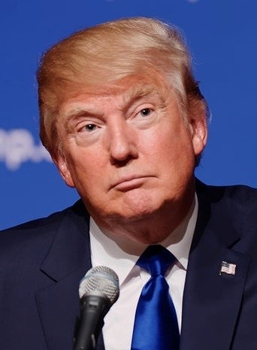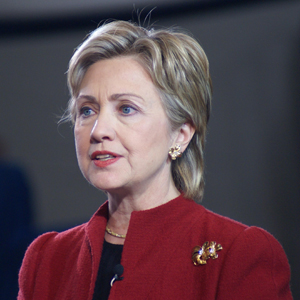For Sunday August 21, 2016
Lectionary Readings (Revised Common Lectionary, Year C)
Jeremiah 1:4–10 or Isaiah 58:9b–14
Psalm 71:1–6 or Psalm 103:1–8
Hebrews 12:18–29
Luke 13:10–17
When my wife and I walked the Way of St. Francis this summer, virtually all of the Italians we met were uniformly positive about America. "America is the best," gushed Rosa. "It's my dream to go there," said Marcello. At least three different people said they've always wanted to drive the historic Route 66.
Their enthusiasm made me proud of my country. They reminded me of the many good things about the United States. And I was grateful for that, because right now our presidential election has me pretty discouraged.
Donald Trump can sound like a dangerous demagogue — that is, he appeals to our darkest prejudices instead of to rational arguments. We all know the examples of his violent and vulgar rhetoric.
Many people believe that his character, judgment, temperament, knowledge, and lack of relevant experience make him unqualified to be president. That he has degraded our civic life, our public discourse, and our common decency. That he's a threat to our democracy and national security. Consequently, a growing number of prominent Republicans have repudiated Trump, even if they would never vote for Clinton. (1)
It would be convenient if Hillary Clinton was the obvious alternative to Trump, but that's clearly not the case for almost half of the United States. She too is a deeply flawed candidate with high negatives and low likeability. She has her own long list of faults and failures — foreign governments giving millions to the Clinton Foundation, along with what appears to be a pay-to-play scheme, while she was Secretary of State. The recklessness and hubris of sending classified emails with a private account over an unsecured server in her home. The chronic dissembling. Whitewater. Vince Foster. Benghazi. And the baggage that is Bill.
And so, like their Republican counterparts, some Democrats worry that Clinton's many flaws will lose her the election. "That could happen," fretted a card-carrying liberal to me this week. Repudiating Trump might be easy, but there are good reasons why many people will never vote for Clinton.
 |
|
Donald Trump.
|
A friend of mine had some wise advice. We should honor and listen carefully to what people thought they were supporting when they voted for either of these two deeply flawed candidates. What we honor in these voters are their hopes and dreams for a better America. However unworthy or unqualified the candidates, however complex the questions, we should acknowledge the good and just aspirations of the people who voted for them.
It's pretty easy, and very important, to understand why people are voting for Trump. They're scared. They've been left out and left behind. They don't feel like the Washington elite cares about them or listens to them. The government has done a poor job serving them. Immigration and globalization are complicated issues that are hard to address.
And so, it shouldn't surprise us that they want someone from outside the insider class, someone with force of character and determination, someone brash and bold, to tell it like it is, to voice their fears to the powerful, and to hold our government accountable for their own legitimate concerns.
David Brooks wrote something similar back in March. We should respect the judgment of Trump's supporters, he said, even if we don't respect Trump. They are "a coalition of the dispossessed. They have suffered lost jobs, lost wages, lost dreams. The American system is not working for them, so naturally they are looking for something else."
"Moreover, many in the media, especially me, did not understand how they would express their alienation. We expected Trump to fizzle because we were not socially intermingled with his supporters and did not listen carefully enough. For me, it’s a lesson that I have to change the way I do my job if I’m going to report accurately on this country." (2)
In his book In God's Shadow; Politics in the Hebrew Bible (2012), Michael Walzer, professor emeritus at Princeton's Institute for Advanced Study, says that while the Hebrew Bible contains a lot about politics, it isn't really interested in politics. Rather, it presents us with a "radical anti-politics."
In place of radically relativized politics, says Walzer, the Hebrew Bible commends an ethic or way of life, like Micah 6:8, or this week's alternate reading from Isaiah 58: do justice, love kindness, walk humbly with your God. Protect the weak, feed the poor, care for the widow, free the slaves, and welcome the alien.
The birth of Jesus signaled that God would "bring down rulers from their thrones." In Mark's gospel, the very first words that Jesus spoke announced that "the kingdom of God is at hand." His alternative kingdom would be "not of this world."
That doesn't mean that it's merely spiritual, or relegated to a future age beyond history or in heaven. The kingdom of God that Jesus announced and embodied is what life would be like on earth, here and now, if God were king and the rulers of this world were not (Borg, Crossan).
 |
|
Hillary Clinton.
|
The political, economic, and social subversions would be almost endless — peace making instead of war mongering, liberation not exploitation, sacrifice rather than subjugation, mercy and not vengeance, care for the vulnerable instead of privileges for the powerful, generosity instead of greed, humility rather than hubris, embrace rather than exclusion.
This is the sort of republic, our res publica or "public thing," for which I hope and pray in our presidential election. It's the sort of civic life to which all people rightly aspire, and toward which we should all work.
Back in 2004, in a meeting with venture capitalists about declining education standards, the economist Paul Romer famously said that "a crisis is a terrible thing to waste." Perhaps this election cycle will move us beyond partisan polemics and toward bi-partisan co-operation.
This political moment won't end with our presidential election. Either Trump or Clinton will have the task of uniting our deeply divided country. And "we the people" will have the responsibility of holding them accountable to build "a more perfect union."
Whoever it is, I hope and pray that they will imitate what Doris Kearns has called "the political genius" of that great Republican Abraham Lincoln, and form a "team of rivals" that works for the good of the entire country.
(1) For a continually updated list of prominent Republicans who have repudiated Trump, see http://thehill.com/blogs/ballot-box/presidential-races/list-republicans-who-oppose-donald-trump-endorse-hillary-clinton
(2) For David Brooks, see http://www.nytimes.com/2016/03/18/opinion/no-not-trump-not-ever.html?_r=0
Image credits: (1) Wikipedia.org and (2) Wikipedia.org.





